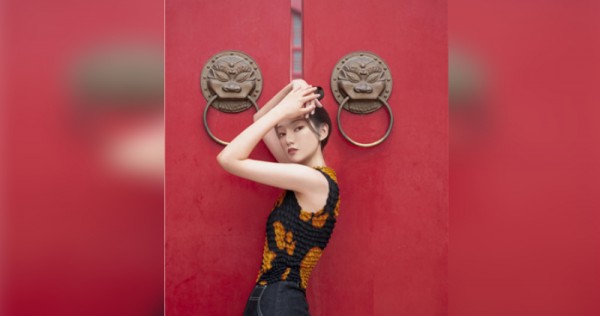Virtual beauty takes stage
虛擬偶像新潮破圈,傳播中國傳統文化
When you take a closer look at the photos of the 36 contestants for CCTV 3's talent show Bravo Youngsters, you may find something different.
當你細看央視三套選秀節目《上線吧!華彩少年》公布的36名選手的照片時,你會發現一些不同之處。
Ling, one contestant on the show, is seemingly perfect. The 25-year-old Beijing woman is a social media influencer, whose realistic appearance is computer generated.
該節目的一名選手翎,看起來十分完美。這位25歲北京女孩是位社交媒體紅人,她那逼真的外表其實是由電腦生成的。
Yet Ling behaves like an actual human social media star. She attends fashion events, promotes designer clothes and brands, and shares her life on Sina Weibo.
但翎的行為舉止就像社交媒體上的真人明星一樣。她出席時尚活動、宣傳設計師服裝品牌,在新浪微博上分享自己的生活。
"I love traditional Chinese culture, especially Peking Opera, calligraphy and tai chi. I hope that I can interpret these art forms in my own way on the stage," Ling posted on her weibo account on Nov 22.
“我熱愛中國傳統文化,特別是京劇,毛筆字和太極。希望我能用自己的方式在舞臺上演繹這些藝術形式,”翎11月22日在自己的微博賬號上發帖表示。
Actually, Ling herself is the best illustration of her love for Chinese traditional culture.
事實上,翎自己就是她對中國傳統文化熱愛的最好詮釋。
Her name, Ling, comes from the feathered headdress worn in Peking Opera. Her voice in the talent show follows the school of the late Peking Opera master Mei Lanfang. And her face is even designed to look good while wearing Peking Opera makeup.
她的名字“翎”源于京劇中的羽毛頭飾。她在選秀中的聲音模仿的是已故京劇大師梅蘭芳的梅派。甚至她的面部也設計成畫京劇妝容時好看的樣子。
According to Chen Yan, founder of Beijing Next Generation Culture Media, the company behind Ling, they aimed to build the virtual idol into a web influencer interested in guofeng (Chinese national style).
北京次世文化傳媒有限公司是翎的幕后公司,該公司創始人陳燕表示,他們想要打造一個對國風(中國風格)感興趣的虛擬網紅。

Ling has "broken down barriers between the real and virtual worlds ... and helped to promote Chinese culture around the world", said Chen, adding that she'll later open accounts on other social media platforms like Instagram and Facebook.
陳燕表示,翎“打破了現實和虛擬世界的屏障,助力在全球傳播中國文化。”陳燕還表示,她之后會在Instagram和臉書等其他社交媒體平臺開通賬號。
Ling is not the only virtual idol who is attracting Chinese youths growing up in the internet era. The virtual idols are almost everywhere, from holographic concerts and talent shows to e-commerce livestreaming platforms. Statistics from market consulting group iResearch show the country's animation, comics and games (ACG) fan base is expected to reach 410 million by the end of this year.
翎不是唯一一個吸引著互聯網時代中成長的中國青年的虛擬偶像。這樣的虛擬偶像幾乎隨處可見,從全息成像的演唱會,到選秀節目,再到電商直播平臺。市場咨詢公司艾瑞咨詢的數據顯示,截至今年年底,中國的動漫游戲粉絲群有望達到4.1億。
Chen Zhe from the company Frees Fund, believes that the rise of virtual influencers will bring challenges and opportunities.
峰瑞資本的陳哲認為,虛擬網紅的崛起將帶來挑戰和機遇。
"On the one hand, they have great advantages. Unlike human influencers who will get old, or may become involved in some sort of scandal, digital influencers are young, flexible, manageable and controllable," he said.
“一方面,他們有很大的優勢。不像真人網紅會變老,或者卷入某種丑聞,數字網紅年輕、靈活、方便管理,”他表示。
"On the other, the market needs more localized virtual influencers whose content design is tailored to connect with Chinese people and more modes of commercial collaboration need to be explored."
“另一方面,市場需要更多本地化的虛擬網紅,它們的內容設計為與中國人產生共鳴而專門定制,還有更多的商業協作模式需要探索。”
Chen Yan also pointed out that although influencers like Ling are virtual, their influence is real. Like it or not, they will bring big changes to the entertainment and fashion industries in the near future.
陳燕也指出,雖然像翎這樣的網紅是虛擬的,但它們的影響力是真實的。不管人們是否喜歡,在不久的將來,它們將給娛樂和時尚產業帶來巨大改變。











